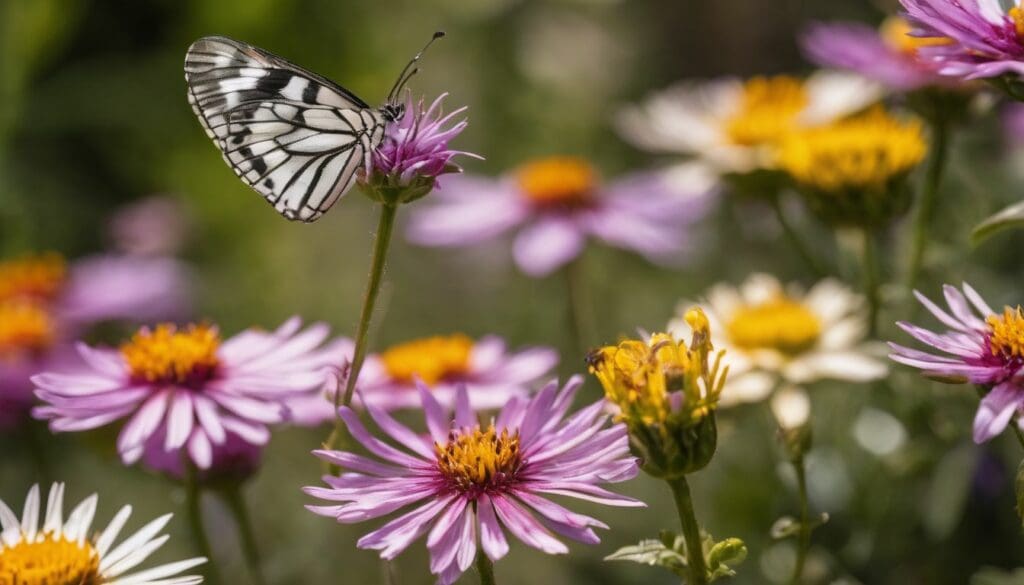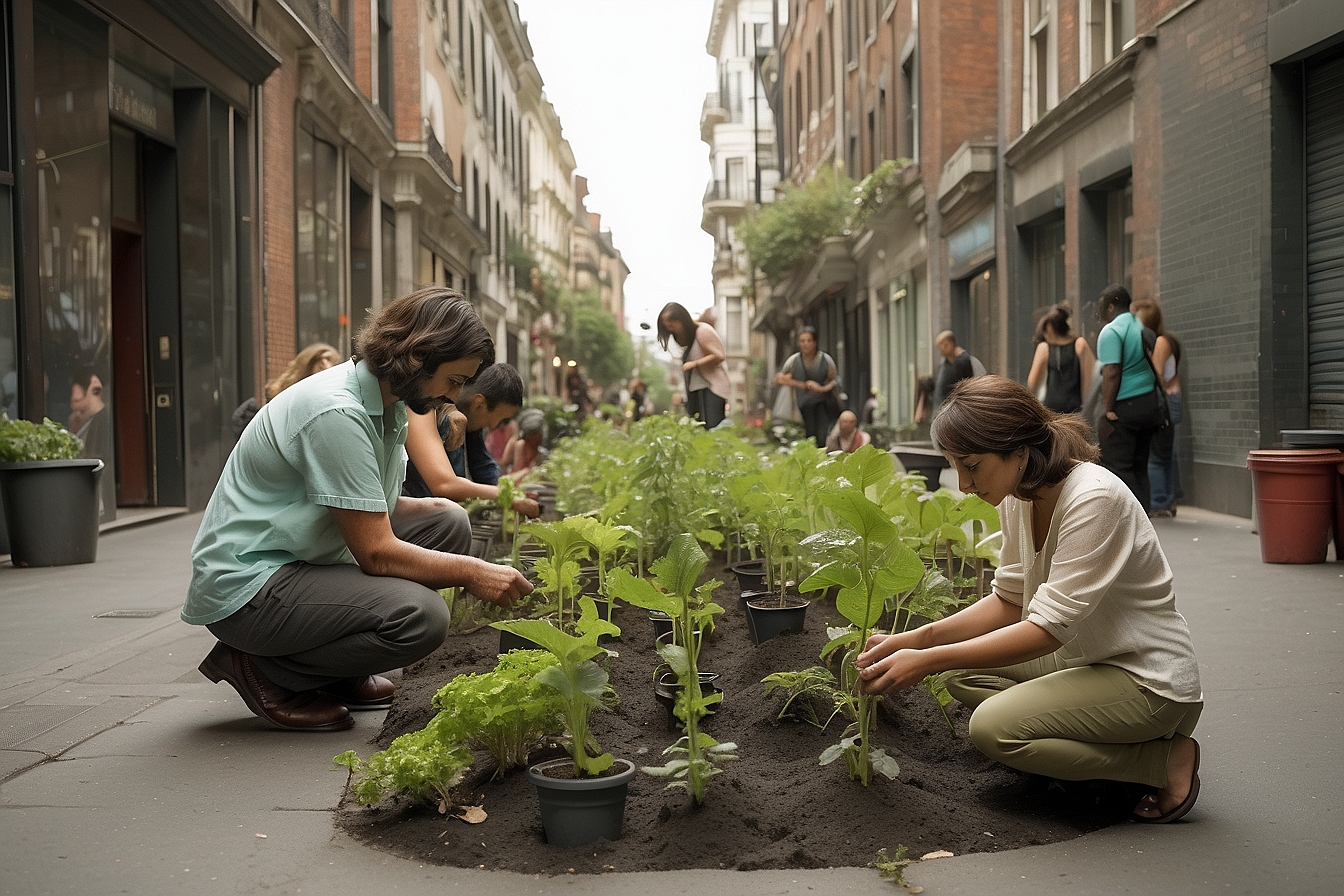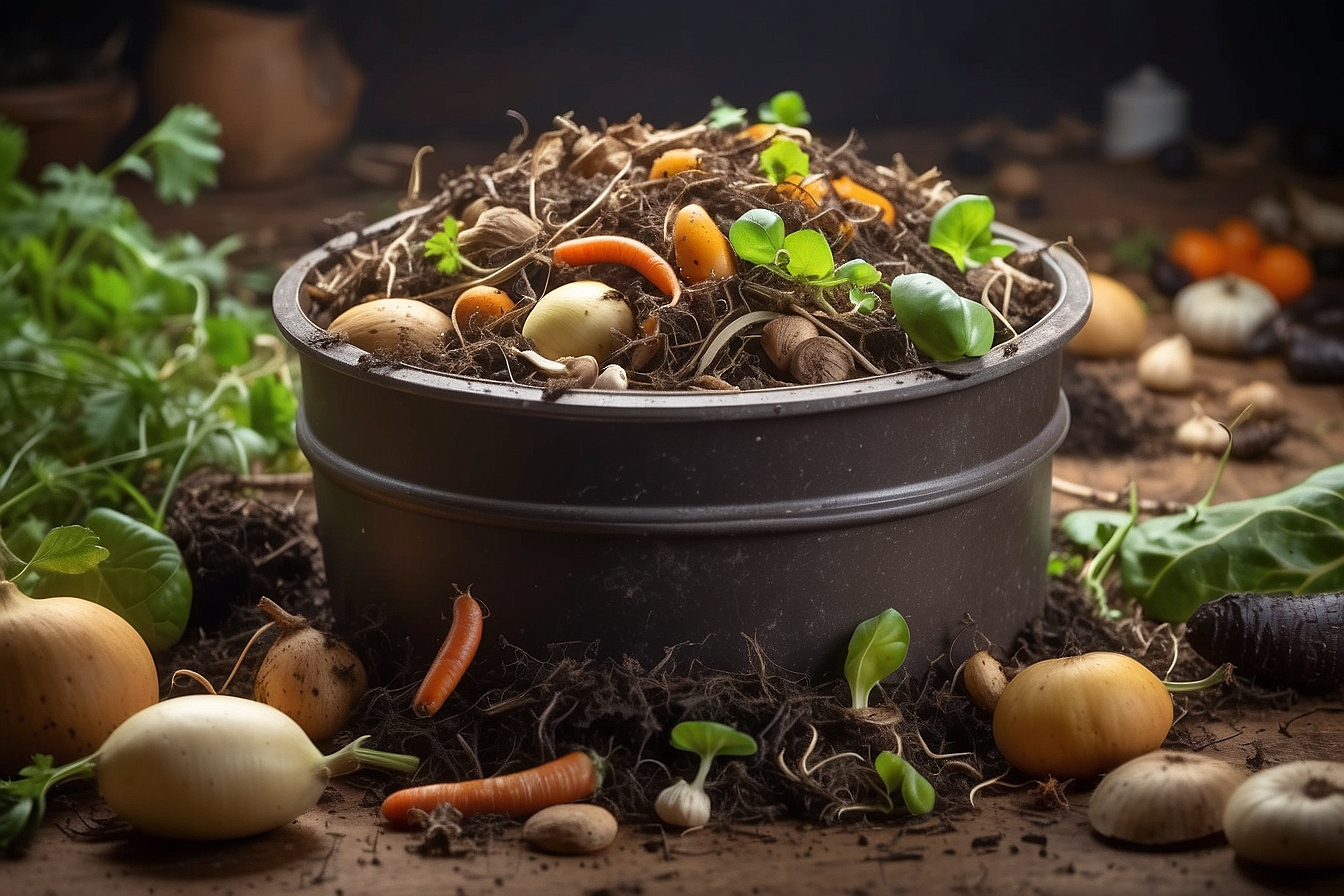Are you tired of pesky critters wreaking havoc in your beloved garden? We’ve been there too, and it’s comforting to know that for every troublesome pest, a natural solution exists.
Our comprehensive guide offers a treasure trove of eco-friendly tactics to keep your plants safe without compromising the health of our planet. Dive in and discover how Mother Nature’s own tools can safeguard your green oasis!
Key Takeaways
- Employing natural pest control like beneficial insects and homemade remedies supports a healthy ecosystem in your garden.
- Organic baking soda pesticide, garlic and chili pepper sprays, neem oil spray, diatomaceous earth, spinosad spray, and milky spore powder are cost-effective DIY solutions to combat pests without using harmful chemicals.
- Prevention methods such as crop rotation, companion planting, mulching and maintaining garden hygiene can deter pests before they become an issue.
- Introducing predators or barriers offers a non – toxic means of controlling common pests like slugs, snails and rodents naturally.
- Choosing environmentally friendly pest management practices contributes to the conservation of biodiversity while ensuring the safety of plants, animals and humans.
Benefits of Natural Pest Control in Your Garden
Natural pest control methods are eco-friendly, safer for plants, animals, and humans, and cost-effective. Using natural pest control helps to maintain a healthy balance in the garden ecosystem while reducing the risks associated with chemical pesticides.
Eco-friendly
We need to think about the bigger picture when taking care of our gardens. Using eco-friendly pest control methods protects local wildlife, preserves the natural balance, and prevents pollutants from entering water sources.
By choosing organic gardening practices over chemicals, we contribute positively to environmental conservation.
Our approach favours homemade pest control recipes and beneficial insects that work with nature, not against it. Opting for nontoxic pest control methods for your garden means we’re part of a community dedicated to sustainability and protecting biodiversity.
With each environmentally friendly choice, such as companion planting or biological control, we take a step towards a healthier ecosystem for future generations.
Safer for plants, animals, and humans
Safer natural pest control methods are better for plants, animals, and humans. Organic pest control reduces the risk of harmful chemicals harming your garden’s ecosystem. Using non-chemical options helps maintain a healthy environment for all living beings in and around your garden.
Cost-effective
Transitioning from the safer-for-plants, animals, and humans pest control methods, let’s discuss the cost-effective nature of natural pest control. By using homemade remedies, beneficial insects, and traps or barriers, you can significantly reduce your spending on commercial pesticides.
Moreover, many DIY natural pest control recipes utilise ingredients that are already available in your kitchen or garden, making them a budget-friendly alternative to store-bought chemicals.
Embracing cost-effective natural pest control methods not only benefits your wallet but also promotes sustainability by reducing reliance on expensive chemical solutions.
Types of Natural Pest Control Methods
Prevention methods such as crop rotation and companion planting, use of beneficial insects like ladybugs and lacewings, homemade remedies like garlic and chili pepper sprays, as well as traps and barriers are all effective natural ways to control pests in your garden.
Prevention methods
To prevent garden pests from becoming a problem, consider the following methods:
- Start with healthy soil: Healthy soil promotes strong plant growth, making them less susceptible to pest infestations.
- Crop rotation: Rotate the placement of your crops each season to disrupt the life cycle of pests and prevent their build-up in the soil.
- Companion planting: By interplanting pest-repelling plants like marigolds and basil with your vegetables or flowers, you can naturally deter pests.
- Mulching: Use organic mulch like straw or wood chips to suppress weed growth and create an environment less hospitable to pests.
- Maintaining garden hygiene: Regularly removing fallen leaves, pruning dead branches, and keeping the garden clean can eliminate hiding spots for pests.
Use of beneficial insects
When attracting beneficial insects to your garden, consider planting flowers such as marigolds, daisies, and sunflowers which attract ladybirds and lacewings.
Homemade remedies
When dealing with garden pests, homemade remedies are a safe and effective way to control their populations. Here are some simple DIY solutions you can make at home using natural ingredients:
- Organic baking soda pesticide: Mix 1 tablespoon of baking soda, 1 teaspoon of mild dish soap, and 1 gallon of water. Spray this mixture on affected plants to deter common garden pests.
- Garlic and chili pepper sprays: Blend several cloves of garlic, a few hot chili peppers, and water. Let the mixture sit for a day before straining it into a spray bottle. This acts as a potent repellent against many insects.
- Neem oil spray: Dilute neem oil with water according to the instructions on the product label and use it to combat various pests while also offering antifungal benefits.
- Diatomaceous earth: Sprinkle this powdery substance around the base of plants or directly on pests to dehydrate and kill them.
- Spinosad spray: Make an organic insecticide by mixing spinosad concentrate with water as directed on the label.
- Milky spore powder: Use this natural bacteria-based powder to control Japanese beetle larvae in lawns and gardens without harming beneficial insects or wildlife.
Traps and barriers
To control garden pests naturally, traps and barriers are effective methods that are safe for the environment. These physical controls help keep insects and rodents at bay without the need for harmful chemicals.
- Use sticky traps to catch aphids and other small flying insects. Place these traps near plants to prevent infestation.
- Install row covers over susceptible plants to create a barrier against pests whilst allowing sunlight and water to reach the plants.
- Build slug barriers using copper tape around plant pots or garden beds as slugs will not cross this barrier due to a reaction with their slime.
- Set up pheromone traps for specific pests such as moths. These lures attract male insects, disrupting their breeding cycle.
- Create barriers by placing diatomaceous earth or coffee grounds around plant stems to deter crawling insects like ants and caterpillars.
Common Garden Pests and Corresponding Natural Controls
Soft-bodied insects like mites, aphids, and mealy bugs can be controlled with homemade remedies like garlic and chili pepper sprays. Rodents can be repelled using natural predators such as owls or by using traps and barriers in the garden.
Soft-bodied insects (mites, aphids, mealy bugs)
Soft-bodied insects like mites, aphids, and mealy bugs can wreak havoc on your garden plants by sucking out vital nutrients. To naturally control these pests, consider introducing ladybugs or lacewings to your garden as they are natural predators of aphids and mites.
Additionally, applying insecticidal soap or neem oil sprays can effectively manage infestations without harming beneficial insects.
Carefully monitoring your plants for signs of pest presence and acting promptly with natural remedies will help to keep soft-bodied pests at bay. Another effective method is using physical barriers such as row covers to prevent infestations in the first place.
These eco-friendly approaches are not only gentle on the environment but also support the overall health of your garden.
Aphids
Now, let’s move on to discussing aphids, one of the common garden pests you might encounter. These small insects suck sap from the leaves and stems of plants, often causing them to wilt or become distorted.
To naturally control aphids in your garden, consider introducing ladybugs or lacewings that feed on these pests. Additionally, you can make a homemade insecticidal soap using liquid dish soap diluted with water to spray directly onto the affected plants.
This will help reduce aphid populations without harming beneficial insects or other wildlife in your garden.
When managing aphids in your garden, consider planting companion plants like marigolds or chives which repel these pests. Another effective method is blasting affected plants with a strong jet of water to dislodge and remove the aphids.
Spider mites
Having discussed the natural controls for aphids, let’s shift our focus to spider mites. These tiny pests are notorious for causing damage by sucking sap from plants, leaving a fine webbing as evidence of their presence.
To combat spider mites naturally, consider using beneficial insects like ladybugs and predatory mites that feed on these plant-damaging pests. Another effective method is spraying plants with a homemade insecticidal soap solution made from common household ingredients such as liquid soap and water mixed in the right proportions.
By implementing these natural pest control methods, you can effectively manage spider mite infestations without resorting to harmful chemicals.
Slugs and snails
To naturally control slugs and snails in your garden, consider using barriers like copper tape or diatomaceous earth around vulnerable plants. You can also attract natural predators such as birds and frogs to feed on these pests by creating a diverse environment with water sources and shelter.
Avoid overwatering the garden, as damp conditions are attractive to slugs and snails. Additionally, choose resistant plant varieties whenever possible and remove any hiding places for these pests, such as debris or old boards.
Reapply any barriers after rainfall or watering to maintain their effectiveness.
Rodents
To control rodents in your garden, strategically place traps and barriers along their common entry points. Additionally, ensure that all compost bins are tightly sealed to discourage them from scavenging in the vicinity.
It’s important to regularly clear away any clutter or debris where rodents may nest, as this will reduce their population over time. Further consider growing plants such as lavender, daffodils, and catnip which naturally repel rodents with their strong scents.
Employ pet cats or install bird feeders to attract natural predators of rodents to your garden. Moreover, keeping a clean and tidy garden helps deter these pests by eliminating food sources and shelter they seek for survival.
Moles
After dealing with rodents in your garden, another common pest you may encounter is moles. These subterranean creatures can cause damage to your lawn and garden by creating unsightly tunnels and mounds of soil.
To control moles naturally, consider using deterrents such as castor oil-based repellents or plant barriers made of plants that moles find unappealing, like daffodils, marigolds, or alliums.
Additionally, installing physical barriers such as wire mesh or underground fences can help prevent moles from infiltrating your garden space without causing harm to them.
DIY Natural Pest Control Recipes
Discover simple and effective DIY natural pest control recipes using ingredients like garlic, chili peppers, neem oil, diatomaceous earth, and spinosad spray. These homemade remedies are safe for your plants and the environment while effectively keeping pests at bay in your garden.
Organic baking soda pesticide
Organic baking soda pesticide is a popular and effective natural pest control method for your garden. It can help to deter pests such as aphids, whiteflies, and spider mites without harming beneficial insects. Here are some ways to make and use organic baking soda pesticide:
- Prepare a solution by mixing 1 teaspoon of baking soda, 1 tablespoon of insecticidal soap, and 1 gallon of water in a spray bottle.
- Shake the mixture well and spray it on plants affected by powdery mildew or fungal diseases.
- Reapply the solution every 7 – 14 days or after rainfall to maintain its effectiveness.
- Use organic baking soda pesticide during cooler periods of the day to prevent burning or damaging plant leaves.
- Avoid spraying plants under direct sunlight to minimise any potential negative effects on the foliage.
- Consider spot – testing the solution on a small area of your plants before applying it more broadly to ensure it doesn’t cause any adverse reactions.
- Always follow the recommended concentrations and application frequency for optimal results without posing harm to your garden’s ecosystem.
Garlic and chili pepper sprays
Garlic and chili pepper sprays are natural insect repellents that can effectively control garden pests. These homemade sprays work by repelling and deterring a wide range of insects while being safe for plants, animals, and the environment. When using these sprays, it’s important to dilute them properly to avoid harming your plants.
- Garlic Spray:
- Crush a few cloves of garlic and mix with water in a spray bottle.
- Let the mixture sit for at least 24 hours to infuse the water with the garlic’s natural repellent properties.
- Strain the mixture and spray it onto affected plants.
- Chili Pepper Spray:
- Combine chopped hot peppers or pepper flakes with water in a pot.
- Simmer the mixture for about 15 minutes and allow it to cool.
- Strain out the solids and transfer the liquid into a spray bottle for application.
- Application Tips:
- Apply on a small area first to check for any adverse effects before spraying on entire plants.
- Reapply after rain or as needed to maintain effectiveness.
Neem oil spray
After exploring homemade remedies like garlic and chilli pepper sprays, another effective natural pest control method is using neem oil spray. Neem oil is derived from the seed of the neem tree and has insecticidal properties that can repel and disrupt the growth and reproduction of many garden pests. Here are some ways to use neem oil spray for natural pest control in your garden:
- Mix 1-2 teaspoons of neem oil with a mild liquid soap and water in a sprayer bottle to create an organic pesticide for soft-bodied insects like aphids, mites, and mealybugs.
- Apply neem oil spray to the soil to deter slugs, snails, and larvae of various pests, which helps protect the roots of your plants.
- Utilise neem oil as a foliar spray to combat common garden pests such as spider mites and thrips by disrupting their feeding and growth cycles.
- Consider using neem cake or meal, a byproduct of extracting neem oil, as a natural soil amendment that acts as both a fertiliser and pest repellent.
- Incorporate neem – based products into an integrated pest management approach for your garden to promote plant health while controlling insect infestations.
- Use neem oil sprays early in the morning or late in the afternoon to prevent harming beneficial insects such as bees and butterflies.
- Reapply the neem oil spray every 7 – 14 days or after heavy rainfall for continued protection against garden pests without causing harm to the environment.
Diatomaceous earth
- Kills insects: Diatomaceous earth can be effective against soft-bodied insects like aphids, mites, and mealy bugs by causing damage to their exoskeletons, ultimately leading to dehydration and death.
- Acts as a physical barrier: When sprinkled around plant stems or on the soil surface, diatomaceous earth creates a barrier that deters slugs, snails, and other crawling pests from reaching your plants.
- Environmental safety: Unlike chemical pesticides, diatomaceous earth is environmentally friendly and does not harm beneficial insects or wildlife in your garden.
- Application tips: To use diatomaceous earth effectively, apply it when the foliage is dry and reapply after rain. Be careful not to inhale the dust during application.
Spinosad spray
Spinosad spray is an effective natural insecticide derived from a soil bacterium. It targets a variety of pests including caterpillars, leaf miners, thrips, and certain types of worms.
- Spinosad spray is safe to use around beneficial insects such as bees and ladybirds, making it an ideal choice for environmentally conscious gardeners who want to minimise harm to non-target organisms.
- This natural pesticide has a low toxicity to mammals and breaks down more rapidly in the environment compared to traditional chemical pesticides, reducing its impact on the ecosystem.
- When applying spinosad spray, ensure thorough coverage of both the upper and lower surfaces of plant leaves where pests are most likely to be found.
- Use spinosad spray responsibly by following the instructions on the product label and avoid using it during peak times for pollinators like bees if possible.
- Consider integrating spinosad spray into your overall pest management strategy alongside other natural control methods for a well-rounded approach to garden pest control.
Milky spore powder
Milky spore powder is an effective natural control for Japanese beetle larvae. When applied to the soil, it infects and kills these destructive pests in their grub stage without harming beneficial insects or other wildlife.
- Milky spore powder contains the bacterium Bacillus popilliae, which specifically targets Japanese beetle larvae.
- Once ingested by the larvae, the spores multiply and release a crystal toxin that is lethal to them.
- Over time, milky spore establishes itself in the soil, providing long – term protection against Japanese beetles.
- It’s important to apply milky spore powder in late summer or early fall when grubs are actively feeding and most susceptible to infection.
- This method can take a year or two to reach full effectiveness but provides lasting control without the need for frequent reapplication.
Tips and Considerations for Using Natural Pest Control
Always do a patch test before applying homemade pest control solutions and try non-chemical methods first to minimise risks. Use spreader stickers for better effectiveness and be willing to modify recipes and methods as needed.
Ready to learn more about natural pest control for your garden? Keep reading to find out how you can keep your plants healthy without harmful chemicals.
Do a patch test
Before using any natural pest control method in your garden, it’s essential to do a patch test on a small section of your plants. This will help you ensure that the treatment doesn’t cause harm or stress to your plants.
To conduct a patch test, apply the pest control solution to a few leaves and monitor them for 24-48 hours. If there are no adverse effects, such as wilting or browning, you can proceed with treating the entire plant.
Performing this simple step can safeguard your garden and prevent unintentional damage.
After preparing any homemade insecticide or natural remedy for pest control in your garden, it is important to always carry out a patch test first before widespread application. This simple practice allows you to observe how the solution interacts with your plants and ensures that it effectively addresses pests without harming your precious vegetation.
Try non-chemical methods first
Before resorting to chemical pesticides, consider trying non-chemical methods like using beneficial insects, traps, barriers, and homemade remedies. Start with prevention methods such as keeping your garden clean and free of debris where pests can hide.
Introduce plants that attract beneficial insects or create physical barriers to keep pests out. Homemade remedies like garlic and chilli pepper sprays can also be effective in controlling certain pests.
Only if these methods fail should you consider chemical options.
Use spreader sticker for better effectiveness
For better effectiveness, incorporate a spreader sticker when applying natural pest control solutions to your garden. This additive helps the spray adhere to the plant’s surface, ensuring maximum coverage and longer-lasting effects.
By using a spreader sticker in conjunction with your DIY pest control recipes or organic insecticides, you can enhance their efficiency and boost their ability to combat garden pests effectively.
Remember that using natural pest control methods with a spreader sticker is an environmentally friendly approach and aligns with our commitment to eco-friendly gardening practices.
Modify recipes and methods as needed
Adjust ingredients and procedures as necessary to suit your specific garden pests and plants. Experiment with different natural pest control recipes to find what works best for you.
Consider factors like weather, time of year, and the severity of the infestation when modifying your pest control methods. Always be observant and flexible in adapting your approach to achieve effective results.
Remember that every garden is unique, so be ready to tailor your strategies accordingly. Embrace a learning mindset and stay open to new ideas for managing pests in an environmentally friendly manner.
Conclusion
In conclusion, natural pest control methods offer an eco-friendly and safer alternative for managing garden pests. By using prevention techniques, beneficial insects, homemade remedies, traps, and barriers, you can protect your plants without harming the environment.
Consider trying organic baking soda pesticide or garlic and chili pepper sprays to tackle common garden pests effectively. Remember to do a patch test before applying any new method to your entire garden.
FAQs
1. What are natural pest control methods for gardens?
Natural pest control methods include using beneficial plants to deter pests, applying homemade insecticides, and practicing DIY garden pest management that is safe and ecofriendly.
2. Can I make my own natural pesticides for my vegetable garden?
Yes, you can create your own natural pesticides using household ingredients which are environmentally friendly and safe for your vegetable garden.
3. Are there any plants that help with pest control in the garden?
Certain plants act as natural deterrents to pests; planting these in or around your vegetable patch can help manage pests without chemicals.
4. How do I keep my garden free from pests without using harmful chemicals?
You can use chemical-free solutions like homemade remedies to protect your plants and ensure an eco-friendly approach to controlling garden pests.
5. Is it possible to maintain a pest-free garden organically?
Absolutely! By employing nonchemical strategies such as introducing beneficial insects and applying organic homemade insecticides, you can sustainably keep your garden clear of unwanted guests.





